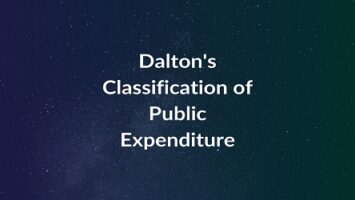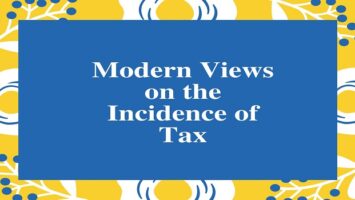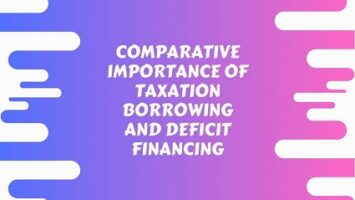Table of Contents
What are Taxes?
Taxes are compulsory payments to governments without the expectation of direct return or benefit to the taxpayer. Bastable defined a tax as a compulsory contribution of the wealth of a person or body of persons for the service of public power. Prof. Seligman also defined a tax as “a compulsory contribution from a person to the government to defray the expenses incurred in the common interest of all, without reference to special benefits conferred. Taussig puts it, the essence of a tax, as distinguished from other charges by the government, is the absence of a direct quid pro quo between the taxpayer and the public authority.
Characteristics of a Tax:
It is, therefore, obvious that a tax possesses three characteristics.
First, a tax is a compulsory contribution to the State from the citizens or even from aliens subject to the jurisdiction for reasons of residence or property and this contribution is for general or common use. As it is a compulsory contribution, no one can refuse to pay a tax on the ground, for instance, since, he does not derive any benefit from certain State services or he has no right to franchise, so he is not liable to pay a tax. Therefore, everyone has to pay a tax upon whom it is levied by the State; it is immaterial whether he is an adult or a minor, or a citizen or an alien. Moreover, the refusal to pay a tax is subject to punishment. However, there are certain qualifications to it. If a particular commodity is taxed, the tax can be avoided by avoiding the consumption of that commodity. Suppose, if there is a tax on liquor, the State can force an individual to pay the tax only when he drinks liquor. But, if he does not drink liquor, he cannot be forced to pay the tax on liquor. Besides, these considerations, a tax is a compulsory payment and because of this characteristic, it can be distinguished from other forms of public revenue.
The second characteristic is that a tax imposes a personal obligation on the taxpayer. It means that it is the duty of the taxpayer to pay the tax if he is liable to pay it and should in no case think to evade it. Suppose a tax is imposed on the incomes of the individuals, the sources of income may be many and the public authority may not be in the know of all those sources. Here it is the duty of the taxpayer to show all of his income and take into account his total income while paying the tax.
The third characteristic is that the contribution received from the taxpayers, may not be incurred for their benefit alone, but for the general and common benefit. As an individual finds himself helpless to meet all his needs, especially those which involve heavy expenditure, i.e., the construction of a hospital, the State renders such services for the benefit of all people. Hence, taxes are imposed upon all those people, who are able to pay them, to share the common burden.
Another characteristic of a tax is said to be, that a tax is not imposed on an individual by the State, because it has rendered specific services to him. Nor, an individual has paid a tax because he receives a special benefit from the State. Thus, taxes are not paid because an individual receives a benefit from the state or is taken from him because the state has rendered any service. But there are certain qualifications to it, for example, a land tax is paid only by those individuals who possess land or drive benefit from the land. Similarly, only those individuals will pay an entertainment tax who receive the benefit of entertainment. It is here, Antonio de Vite de Marco pointed out that the law of taxation in modern states is based on the assumption of an exchange relationship, that is, the exchange of payment to the State for the provision of public services by the State. And therefore, according to De Marco, “the tax is the price which each citizen pays to the State to cover his share of the cost of the general public services which he will consume.” Here it should be noted that the contribution, received from the agriculturists by way of land tax, may not be utilized by the State for their benefit alone, but for the benefit of the entire community. And similarly, the contribution received from individuals for receiving the benefit of their entertainment, may not be utilized for their benefit alone, but for the benefit of the entire community. So there is no relationship between the amount paid by a person as a tax and the benefit received by him. Hence, a tax is a compulsory contribution, and this contribution is for the common benefit and there is no relationship of benefit between the services rendered by the government and the payment of a tax.
Elements of a Tax:
From the above analysis, we can conclude that the following are the elements of a Tax:
(1) A tax is a compulsory contribution if the taxpayer has attained the condition for the imposition of a tax, as laid down in the law.
(2) Taxes are imposed by a government only. If the management or trust of a temple makes it compulsory for every family in a particular area to pay a specified sum every year, it can never be called a tax.
(3) In the payment of a tax, the element of sacrifice is involved, i.e., the tax-payer pays the taxes for the general interest of the community.
(4) The aim of taxation is the welfare of the community as a whole, i.e., tax revenue is incurred for the welfare of the community as a whole, i.e., tax revenue is incurred for the welfare of the community whole, and not of a particular section of the community at one hand, and removing disparities of income on the other.
(5) The benefit is not the condition of the payment of a tax. Taxes are exacted because they are compulsory, the public expenditure is done for the common benefit, and the benefit may not be in proportion to the payment of a tax.
(6) A tax is not imposed upon an individual to realize the cost of benefit from him. A poor person may be benefitted most by way of public expenditure, but he may be least affected by way of taxation, i.e., a tax has no relation with the cost of service that a government renders to an individual.
(7) Taxes may be assessed on income or capital, but they are actually paid out of income.
(8) A tax may be imposed upon an individual or property or commodities, but they are actually paid by individuals.
(9) A tax is a legal collection.









Comments (No)